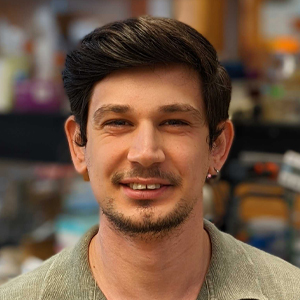‘Challenging membrane’ researcher wins JBC/Tabor award
Hannah Kondolf has an undergraduate degree in human biology, health and society from Cornell University. She always planned to go to medical school, but as she spent time in the lab at Cornell, she decided she wanted to pursue a career in biomedical research as well. She decided to combine her interests and get an M.D./Ph.D.

She entered grad school with many interests and an open mind, focusing more on finding a good mentor than a specific research topic. She ended up in a laboratory at Case Western Reserve University that works on gasdermins, a family of proteins that causes pores in cellular membranes.
“My undergrad major was kind of an introduction to different sciences,” Kondolf said. “Since it was in a nutrition department and had classes on metabolism, it was pretty heavy in biochemistry. However, I actually never took any immunology classes in undergrad. So, much to my surprise, and completely different from my undergrad, I ended up doing my Ph.D. in immunology.”
By the end of her first rotation in Derek Abbott’s laboratory, she was confident it was the lab she would join. Just as she started to work on gasdermins, she said, the field started to blow up and, as a young Ph.D. student, Kondolf felt a bit nervous. She chose to focus on gasdermin A, the gasdermin protein family member that researchers knew the least about.
The gasdermin protein family, gasdermin A to gasdermin E and pejvakin, creates pores in the cell membrane, which, in cases of infection, results in cell death. Kondolf showed how localization of gasdermin A and gasdermin D is different in the cell and how the two proteins follow different pathways to initiate cell lyses. This work earned a 2024 Journal of Biological Chemistry Herbert Tabor Early Career Investigator Award.
Kondolf received her Ph.D. in April 2023. She will graduate from medical school in May 2025. After finishing her medical training, she plans to continue in research.
It is easy to lose life–work balance on the Ph.D. journey, especially combined with medical school, but Kondolf never gave up things she likes to do.
“I'm a pretty outdoorsy person,” she said. “I really enjoy sports. I have a soccer team here, in Cleveland. It's a great way to meet people. I played on a soccer team in D.C. during my gap years as well, and I've met a lot of my friends that way.
“I also really like to bake. The nice thing about working in a lab, especially one with surrounding labs, is I had a group of people that I can test out baked goods on, and who could help me eat all the cookies I would bake.”
Making holes in membranes
Organisms have multiple immune system responses to infections. Pyroptosis, or lytic cell death, is one of them. It has evolved as a way of removing intracellular infectious agents by forming pores in cell membranes, resulting in cell death.
The gasdermin protein family plays a crucial role in initiating lytic cell death. Activated gasdermin protein moves toward a cellular or organelle membrane, binds membrane lipids, forms pores and disrupts membrane integrity. This pathway leads to cell death. The biggest question in this field is how and when gasdermin proteins are activated.
Hannah Kondolf and her colleagues at Case Western Reserve University developed a system that activates gasdermin proteins in an efficient and equivalent manner. Also, they showed that localization of gasdermin A and gasdermin D is different; while gasdermin D targets both the mitochondrial and cellular membranes equally, gasdermin A preferentially disrupts mitochondrial membranes.
Scientists used to think all gasdermin family members initiate cell death through identical mechanisms. However, Kondolf and other scientists have shown that their activation in their respective tissues of expression likely results in different immunological outcomes. This study will help researchers understand how gasdermin proteins work and how we can use them for targeting therapies.
Enjoy reading ASBMB Today?
Become a member to receive the print edition four times a year and the digital edition monthly.
Learn moreGet the latest from ASBMB Today
Enter your email address, and we’ll send you a weekly email with recent articles, interviews and more.
Latest in People
People highlights or most popular articles

Sketching, scribbling and scicomm
Graduate student Ari Paiz describes how her love of science and art blend to make her an effective science communicator.

Embrace your neurodivergence and flourish in college
This guide offers practical advice on setting yourself up for success — learn how to leverage campus resources, work with professors and embrace your strengths.

Survival tools for a neurodivergent brain in academia
Working in academia is hard, and being neurodivergent makes it harder. Here are a few tools that may help, from a Ph.D. student with ADHD.

Quieting the static: Building inclusive STEM classrooms
Christin Monroe, an assistant professor of chemistry at Landmark College, offers practical tips to help educators make their classrooms more accessible to neurodivergent scientists.

Hidden strengths of an autistic scientist
Navigating the world of scientific research as an autistic scientist comes with unique challenges —microaggressions, communication hurdles and the constant pressure to conform to social norms, postbaccalaureate student Taylor Stolberg writes.

Richard Silverman to speak at ASBMB 2025
Richard Silverman and Melissa Moore are the featured speakers at the ASBMB annual meeting to be held April 12-15 in Chicago.

